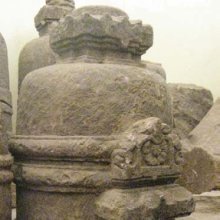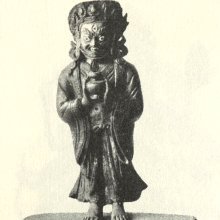Ci: 11 definitions
Introduction:
Ci means something in Hinduism, Sanskrit, Marathi, Hindi, Tamil. If you want to know the exact meaning, history, etymology or English translation of this term then check out the descriptions on this page. Add your comment or reference to a book if you want to contribute to this summary article.
Alternative spellings of this word include Chi.
Images (photo gallery)
(+250 more images available)
Languages of India and abroad
Marathi-English dictionary
Source: DDSA: The Molesworth Marathi and English Dictionaryci (चि).—ind An emphatic or enhancing expletive constantly occurring in poetry. See fully under ca ind. Where ci occurs followed by yā, as ciyā, there it is merely the genitive particle now blended and written cyā.
--- OR ---
cī (ची).—ind (Poetry.) See ci & ca ind.
--- OR ---
cī (ची).—f (Imit.) The cry in acknowledgment of defeat or inability (among wrestlers &c.; by a disputant; by one who had over-rated his powers &c.) v mhaṇa. 2 The whiz of a passing shot. v vāja.
Marathi is an Indo-European language having over 70 million native speakers people in (predominantly) Maharashtra India. Marathi, like many other Indo-Aryan languages, evolved from early forms of Prakrit, which itself is a subset of Sanskrit, one of the most ancient languages of the world.
Sanskrit dictionary
Source: DDSA: The practical Sanskrit-English dictionaryCi (चि).—I. 5 U. (cinoti, cinute, cikā-cā-ya, cicye-kye, acaiṣītaceṣṭa, cetum, -cita; caus. cāyayati, cāpayati, also cayayati, capa- yati desid. cicīṣati, -cikīṣati)
1) To collect, gather, accumulate (said to govern two accusatives being a dvikarmaka root, but this use is very rare in classical literature), वृक्षं पुष्पाणि चिन्वती (vṛkṣaṃ puṣpāṇi cinvatī).
2) To gather for oneself, acquire, gain; चिचीषतां चन्मवतामलध्वीं भूतिम् (cicīṣatāṃ canmavatāmaladhvīṃ bhūtim) Kirātārjunīya 3.11; 2.19; Mv.3.4.
3) To search, look out for; Bhartṛhari 3.46.
4) To pile or heap up, place in a line; पर्वतानिव ते भूमा- वचैषुर्वानरोत्तमान् (parvatāniva te bhūmā- vacaiṣurvānarottamān) Bhaṭṭikāvya 15.76.
5) To set, inlay, cover or fill with, see चित (cita). pass. To bear fruit, grow, increase, thrive, prosper; सिच्यते चीयते चैव लता पुष्पफलप्रदा (sicyate cīyate caiva latā puṣpaphalapradā) Pañcatantra (Bombay) 1.222 bears fruit; चीयते बालिशस्यापि सत्क्षेत्रपतिता कृषिः (cīyate bāliśasyāpi satkṣetrapatitā kṛṣiḥ) Mu.1.3; गजहंस तव सैव शुभ्रता जीयते न च न चापचीयते (gajahaṃsa tava saiva śubhratā jīyate na ca na cāpacīyate) K. P.1. -II. 3 P. (ciketi) Ved.
1) To observe, see, perceive.
2) To look steadfastly upon.
3) To be intent upon.
4) To seek for, search, investigate, make inquiries, search through. -III. 1 Ā. (cayate)
1) To detest, hate.
2) To revenge, take vengeance on. -IV. 1 U. (cāyati-te)
1) To fear, dread, be afraid of (with acc.)
2) To respect, honour.
3) To observe; cf. चाय् (cāy).
Source: Cologne Digital Sanskrit Dictionaries: Shabda-Sagara Sanskrit-English DictionaryCi (चि).—[(ciña) ciñ] r. 1st, 5th and 10th cls. (cayati-te cinoti cayayati or capayati) To collect, to gather together, to heap, to assemble, to accumulate, &c. With apa, To lose, to squander. With upa or sam, To collect or acquire. With nir, To determine. With vi and nir, To determine exactly (īraṇa) īraṇic r. 1st cl. (cayati) to injure, (peculiar to the Vedas.) bhvā ubha-aniṭ . curā-ubha . svā-ubha-dvika-aniṭ .
Source: Cologne Digital Sanskrit Dictionaries: Benfey Sanskrit-English DictionaryCi (चि).—ii. 5, cinu, [Parasmaipada.] [Ātmanepada.] 1. To arrange, Mahābhārata 12, 10745. 2. To heap, [Bhāgavata-Purāṇa, (ed. Burnouf.)] 4, 28, 15. 3. To collect, to gather, Mahābhārata 1, 7719. 4. To cover, [Arjunasamāgama] 9, 9. cita, Full, [Rāmāyaṇa] 3, 68, 12. citā, see separately.
— [Causal.] cāyaya and cāpaya. † 1, 10, cayaya and capaya, To heap, to collect.
— With the prep. apa apa, 1. To gather, [Rāmāyaṇa] 2, 100, 5. 2. To diminish, Mārk. P. 29, 8; apacita, fallen off, [Śākuntala, (ed. Böhtlingk.)] [distich] 37. 3. To deprive, Mahābhārata 3, 1319.
— With ava ava, To gather, [Pañcatantra] 93. 4.
— With ā ā, 1. To heap on, Bhā P. 4, 29, 78. 2. To cover, [Rāmāyaṇa] 6, 20, 23.
— With avā ava-ā, To heap on, Mahābhārata 12, 5952.
— With samā sam-ā, 1. To heap, [Harivaṃśa, (ed. Calc.)] 14815. 2. To cover, Mahābhārata 7, 7242.
— With ud ud, To gather, [Kathāsaritsāgara, (ed. Brockhaus.)] 22, 109.
— With samud sam-ud, To arrange, Mahābhārata 2, 2087 (anomalous absolut. samuccīya).
— With upa upa, 1. To collect, to augment, Mahābhārata 5, 473. 2. To cover, Mahābhārata 3, 11962. cīya, pass. To increase, [Bhartṛhari, (ed. Bohlen.)] 2, 84; to profit, [Mānavadharmaśāstra] 8, 169. upacita, 1. Well-fed, Mahābhārata 13, 4460. 2. Prosperous, [Raghuvaṃśa, (ed. Stenzler.)] 17, 54. 3. Loaded, [Mānavadharmaśāstra] 6, 41. 4. Endowed, Ram. 3, 41, 19.
— With ni ni, 1. To pile up, Mahābhārata 12, 2099. 2. To erect, Mahābhārata 14, 2635. 3. To cover, [Rāmāyaṇa] 6, 32, 24. 4. To fill, Mahābhārata 3, 650. 5. To stagnate, [Suśruta] 1, 92, 19.
— With saṃni sam-ni, To stagnate, [Suśruta] 2, 430, 15.
— With pari pari, 1. To collect, [Rājataraṅgiṇī] 4, 354. 2. To augment, [Bhāgavata-Purāṇa, (ed. Burnouf.)] 5, 7, 11. 3. To fill, [Bhāgavata-Purāṇa, (ed. Burnouf.)] 4, 9, 13.
— With pra pra, 1. To gather, [Harivaṃśa, (ed. Calc.)] 5237. 2. To cut, Mahābhārata 5, 1865. 3. pass. To increase, Mahābhārata 14, 509. 4. To cover, Mahābhārata 12, 1702.
— With saṃpra sam-pra, To cease gathering, Mahābhārata 12, 5952.
— With vi vi, 1. To select, Mahābhārata 5 1111. 2. To pick out, [Devīmāhātmya, (ed. Poley.)] 2, 67 (anomalous vicinvati, instead of noti).
— With saṃvi sam-vi, To segregate, [Rāmāyaṇa] 5, 85, 18.
— With sam sam, 1. To heap up, [Rāmāyaṇa] 1, 13, 30. 2. To collect, [Mānavadharmaśāstra] 6, 15. Saṃcita, 1. Dense, [Rāmāyaṇa] 5, 59, 13. 2. Provided, Mahābhārata 6, 3327.
— With parisam pari-sam, To collect, Sāh. D. 73, 12.
— Cf. [Latin] capio = [Causal.] capayāmi, capulus, capistrum; perhaps also and [Gothic.] hafjan, hafan, hafts; [Anglo-Saxon.] hebban, thu hefest; Engl. to heave.
--- OR ---
Ci (चि).—ii. 5, cinu, [Parasmaipada.], [Ātmanepada.] 1. To search, [Kathāsaritsāgara, (ed. Brockhaus.)] 26, 136. 2. To search through, Mahābhārata 3, 2659.
— With the prep. apa apa, apacita, 1. Honoured, Mahābhārata 3, 10835. 2. Invited, [Bhāgavata-Purāṇa, (ed. Burnouf.)] 5, 3, 9. n. Honour, Mahābhārata 9, 3620,
— With ava ava, To honour, Mahābhārata 3, 10676.
— With nis nis, 1. To know thoroughly, [Rājataraṅgiṇī] 5, 124. 2. To decide, [Rāmāyaṇa] 2, 1, 26. niścita, n. Resolution, [Rāmāyaṇa] 5, 15, 57. niścita + m, adv. Certainly, [Pañcatantra] 223, 7.
Source: Cologne Digital Sanskrit Dictionaries: Cappeller Sanskrit-English DictionaryCi (चि).—1. cinoṇi cinute (ceti, cayati, cinvati) [participle] 1 cita (q.v.) heap up, pile up, arrange, construct, build ([especially] the sacrific. altar); collect, gather; cover, inlay, set with ([instrumental]); [Passive] cīyate increase, thrive, abound. [Causative] cayayati & capayati, cāyayati & cāpayati.
--- OR ---
Ci (चि).—2. ciketi, cinoti, cinute (cayate) observe, perceive, notice, seek for, search. —anu remember. apa respect, honour. ni notice, observe. nis & vinis examine, consider, fix upon. pari search, examine, find out, discover. [Passive] get acquainted. vi discern, distinguish, make clear, illustrate, examine, try, look for, strive after. pravi examine, try. sam deliberate, ponder. — Cf. apacita, abhiniścita, 2 nicita, niṃścita, 2 paricita, viniścita.
--- OR ---
Ci (चि).—3. cayate detest, hate, punish, revenge, take vengeance on ([accusative]).
Source: Cologne Digital Sanskrit Dictionaries: Monier-Williams Sanskrit-English Dictionary1) Ci (चि):—1. ci [class] 5. cinoti, nute (1. [plural] cinumas and nmas, [Pāṇini 6-4, 107]; perf. cikāya and cicāya, [vii, 3, 58]; 2. cicetha, [2, 61; Kāśikā-vṛtti]; 3. [plural] cikyur, [Atharva-veda x, 2, 4]; p. cikivas, [Kāṭhaka xxii, 6]; [Ātmanepada] cikye and cicye, [Vopadeva xii, 2]; p. cikyāna, [Taittirīya-saṃhitā v]; 2nd [future] p. ceṣyat, [Lāṭyāyana]; 1st [future] cetā, [Pāṇini 7-2, 61; Kāśikā-vṛtti]; [Aorist] acaiṣīt, [Kāśikā-vṛtti on iii, 1, 42 and vii, 2, 1]; [Vedic or Veda] cikayām akar, [iii, 1, 42; Kāśikā-vṛtti]; 1. sg. acaiṣam, 2. sg. acais, [Kāṭhaka xxii, 6]; 3. [plural] acaiṣur, [Bhaṭṭi-kāvya]; [Ātmanepada] aceṣṭa, [Pāṇini 1-2, 11; Kāśikā-vṛtti]; Prec. ceṣīṣṭa, [ib.], or cīyāt, [vii, 4, 25; Kāśikā-vṛtti]; [indeclinable participle] citvā, [Atharva-veda] etc.; [Passive voice] cīyate, [Muṇḍaka-upaniṣad] etc.; [future] cāyiṣyate & ceṣy [Conditional] acāyiṣyata & aceṣy, [Pāṇini 6-4, 62; Kāśikā-vṛtti])
—to arrange in order, heap up, pile up, construct (a sacrificial altar; [Parasmaipada], if the priests construct the altar for another; [Ātmanepada], if the sacrificer builds it for himself), [Atharva-veda; Vājasaneyi-saṃhitā; Taittirīya-saṃhitā v; Kāṭhaka; Śatapatha-brāhmaṇa];
—to collect, gather together, accumulate, acquire for one’s self, [Muṇḍaka-upaniṣad; Mahābhārata i, v];
—to search through (for collecting; cf. √2. ci), [Mahābhārata v, 1255; Kāmandakīya-nītisāra] ([Pañcatantra]);
—to cover, inlay, set with, [Mahābhārata];
— [Passive voice] cīyate, to become covered with, [Suśruta v, 8, 31];
—to increase, thrive, [Mudrārākṣasa i, 3; Kāvyaprakāśa x, 52 a/b] ([Sāhitya-darpaṇa]) :—[Causal] cayayati and capay, to heap up, gather, [Dhātupāṭha xxxii, 85];—cāyayati and cāpay, [Pāṇini 6-1, 54] :—[Desiderative] cikīṣate (also ti, [vii, 3, 58; Kāśikā-vṛtti]) to wish to pile up, [Śatapatha-brāhmaṇa ix; Kātyāyana-śrauta-sūtra xvi];—cicīṣati ([Pāṇini 7-3, 58; Kāśikā-vṛtti; vi, 4, 16,][ed. vivīṣ] [Kāśikā-vṛtti])
—to wish to accumulate or collect, [Kirātārjunīya ii, 19; iii, 11] :
—[Desiderative] [Causal] (p. cicīṣayat) to cause any one to wish to arrange in order, [Bhaṭṭi-kāvya iii, 33] :—[Intensive] cecīyate, [Kāśikā-vṛtti on Pāṇini 7-3, 58; 4, 25 and 82.]
2) 2. ci [Vedic or Veda] [class] 3. (ciketi, [from] √ki, [Dhātupāṭha xv, 19]; [imperative] ciketu, [Taittirīya-saṃhitā]; [subjunctive] [Ātmanepada] ciketa; [imperfect tense] aciket, [Ṛg-veda x, 51, 3]; [Aorist] 2. [plural] [Ātmanepada] acidhvam, [Ṛg-veda]; 3. sg. acait; cikayām akaḥ [from] √4. cit, [Grassmann], [vi, 44, 7])
2) —to observe, perceive (with [accusative] or [genitive case]), [Ṛg-veda; Kāṭhaka viii, 10];
2) —to fix the gaze upon, be intent upon, [Ṛg-veda v, 55, 7; Taittirīya-saṃhitā iii];
2) —to seek for, [Ṛg-veda vi, 44, 7] : Class. [class] 5. cinoti (p. nvat, [Ātmanepada] nvāna)
2) —to seek for, investigate, search through, make inquiries (cf. √1. ci), [Mahābhārata iii, 2659; Bhartṛhari; Kathāsaritsāgara xxvi, 136] :—[Intensive] cekite See √4. cit;
3) cf. [Latin] scio.
4) 3. ci [class] 1. cayate (p. cayamāna) to detest, hate ([Nirukta, by Yāska iv, 25]), [Ṛg-veda i, 167, 8 and 190, 5; vii, 52, 2];
—to revenge, punish, take vengeance on ([accusative]), [ii, 27, 4; ix, 47, 2; Aitareya-brāhmaṇa ii, 7];—(cf. apaciti, kāti; τίνομαι τινά, τίω, τίσις, ποινή.)
Source: Cologne Digital Sanskrit Dictionaries: Yates Sanskrit-English DictionaryCi (चि):—[(ña, na, ka) cayati, te, cinoti, cāyayati] 1. 5. 10. c. To collect, heap up; to injure. With apa to lose, squander; with upa or saṃ to collect; with nira to determine; with vi to distinguish; with vi and nir to determine exactly.
[Sanskrit to German]
Sanskrit, also spelled संस्कृतम् (saṃskṛtam), is an ancient language of India commonly seen as the grandmother of the Indo-European language family (even English!). Closely allied with Prakrit and Pali, Sanskrit is more exhaustive in both grammar and terms and has the most extensive collection of literature in the world, greatly surpassing its sister-languages Greek and Latin.
Hindi dictionary
Source: DDSA: A practical Hindi-English dictionaryCī (ची):—— a suffix which imparts the meaning of one who keeps or uses, e.g. [topacī, aphīmacī] or act as diminutive e.g. [saṃdūkacī].
...
Tamil dictionary
Source: DDSA: University of Madras: Tamil LexiconCi (சி) . The compound of ச் [c] and இ. [i.]
--- OR ---
Ci (சி) noun Abbreviation of சிரஞ்சீவி. [siranchivi.]
--- OR ---
Ci (சி) particle A feminine suffix, as in ஆய்ச்சி; ஒரு பெண்பால்விகுதி. [aychi; oru penpalviguthi.] (வீரசோழீயம் தத்தி. [virasozhiyam thathi.] 5.)
--- OR ---
Cī (சீ) . The compound of ச் [c] and ஈ. [i.]
--- OR ---
Cī (சீ) noun [K. Travancore usage kīvu.]
1. Pus; சீழ். சீயார்ந் தீமொய்த்து [sizh. siyarn thimoythu] (திருவாசகம் [thiruvasagam] 25, 3).
2. Mucous matter, as of the nose; சளி. குமிழ்மூக் குவைகா ணுமிழ்சீ யொழுக்குவ [sali. kumizhmug kuvaiga numizhsi yozhukkuva] (மணிமேகலை [manimegalai] 20, 48).
--- OR ---
Cī (சீ) interjection [Kanarese, Malayalam: Travancore usage cī.] An exclamation of contempt, disgust, repudiation; இகழ்ச்சி வெறுப்புக்களின் குறிப்பு. [igazhchi veruppukkalin kurippu.] — noun Disdain, spurn; அலட்சியம். சீயேது மில்லாதென் செய்பணிகள் கொண்டருளும் [aladsiyam. siyethu millathen seypanigal kondarulum] (திருவாசகம் [thiruvasagam] 10, 12).
--- OR ---
Cī (சீ) [cīttal] 11 transitive verb
1. cf. śṛ. [Malayalam: cī.] To scratch, as fowls; to tear up earth, as pigs; to scrape; கீறிக் கிளறுதல். [kirig kilaruthal.]
2. cf. śṛ. To sweep off, brush away, wipe off; துடைத்தல். மென்பூஞ் செம்மலொடு நன்கலஞ் சீப்ப [thudaithal. menpugn semmalodu nankalagn sippa] (பத்துப்பாட்டு: மதுரைக்காஞ்சி [pathuppattu: mathuraikkanchi] 685).
3. cf. śr. [K. sī.] To expel, remove, root out; போக்குதல். இருள் சீக்குஞ் சுடரேபோல் [pokkuthal. irul sikkugn sudarepol] (கலித்தொகை [kalithogai] 100, 24).
4. To cleanse, purify; தூயதாக்குதல். (சூடாமணிநிகண்டு) [thuyathakkuthal. (sudamaninigandu)]
5. cf. siv. To sharpen; கூர்மையாகச் சீவுதல். கணிச்சிபோற் கோடு சீஇ [kurmaiyagas sivuthal. kanichipor kodu sii] (கலித்தொகை [kalithogai] 101).
--- OR ---
Cī (சீ) < śrī. noun
1. Lakṣmī; இலக்குமி. சீத னங்கோடு புயங்கை கொண்டார் [ilakkumi. sitha nangodu puyangai kondar] (கந்தரந்தாதி [kantharan.] 8).
2. Light, brilliancy; ஒளி. சீவனசத்துருச் செய்யாள் [oli. sivanasathurus seyyal] (கந்தரந்தாதி [kantharan.] 69). — particle An honorific prefix added to the names of deities, eminent persons and sacred objects; சிறப்புக்குறிக்கும் ஓர் அடைமொழி. சீராமன், சீபாதம். [sirappukkurikkum or adaimozhi. siraman, sipatham.]
Tamil is an ancient language of India from the Dravidian family spoken by roughly 250 million people mainly in southern India and Sri Lanka.
See also (Relevant definitions)
Starts with (+5788): Cakkamma, Ceccarisu, Ceccarita, Ceduru, Ci cai, Ci chi ni hua cao, Ci er cai, Ci gu, Ci guo mao gen, Ci guo teng, Ci hua jiao, Ci hua lian zi cao, Ci huai hua, Ci huang guo, Ci huo su mu, Ci ji li, Ci jia mu lan, Ci lao ya, Ci mao bai zhu, Ci qiang wei.
Ends with (+2311): Aatunocci, Abaci, Abbacci, Abhaktaruci, Abhici, Abhiruci, Abhisamci, Abhisinci, Abhiyaci, Abhyukci, Acaci, Acandamarici, Acaravaci, Accavicci, Accavucci, Acci, Accukaci, Aci, Acuci, Acuvayuci.
Full-text (+70201): Shuci, Vici, Chi, Saci, Asuci, Svaruci, Upadhashuci, Sankuci, Ruci, Samici, Hilamoci, Avici, Jalashuci, Vicaya, Shvayici, Drashtri, Avacaya, Apaci, Cita, Shi.
Relevant text
One of your search terms exceeds the minimun character amount per search term. This amount currently equals 2.
No search results for Ci, Cī, Si, See, Chi; (plurals include: Sees, Chis) in any book or story.
Related products
(+39 more products available)











